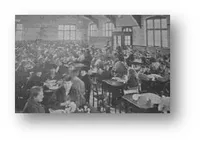The Politics and Practices of Health in Work in Britain, 1915-1960
Researchers: Professor Hilary Marland, Dr Mathew Thomson and Dr Vicky Long
Start date: 1 January 2005 / Completion date: 30 June 2008
This project focuses on the factory as a creative site for health improvement rather than a place of danger to safety and well being between 1915 and 1960. The project takes as its starting point the interests of the state in forging an efficient workforce in the early twentieth century, beginning with the Munitions of War Act (1915), which heralded a cluster of innovative welfare measures in munitions factories.
The project then moves to the inter-war years, exploring the Trades Union Congress’ growing involvement in health matters such as health education, convalescence, holidays with pay, the health problems of women and young workers, mental hygiene and the place of industrial medicine on the medical curriculum, both on its own and in collaboration with medical organisations and the state. The TUC’s growing interest in workers’ health is studied in relation to the depression, changes in the state of industry, the growth of the industrial welfare movement, the status of industrial medicine and the development of the TUC itself as an authoritative voice of organised labour.
The project examines the disruption of the Second World War, looking at new initiatives introduced to improve the health of workers during war time before exploring models of a national industrial health service which were developed in anticipation of a national health service. It concludes by exploring responses to the exclusion industrial health services from the NHS Act, studying the Report of a Committee of Inquiry on Industrial Health Services (1951) which reiterated the government’s stance that occupational health should remain separate from the National Health Service.



